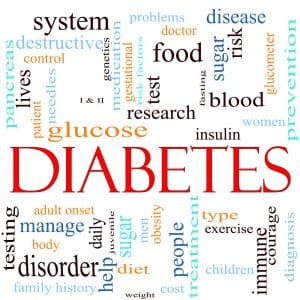
Diabetes awareness focuses on increasing awareness for diabetes and its signs and symptoms. In addition, getting support for research needed toward preventing, treating and curing all forms of the disease is also included. Encouraging people to make healthy changes is one of the main goals of diabetes awareness. Diabetes can cause blindness, nerve damage, kidney disease, and other health issues. It is one of the leading causes of disability and death in the United States. Almost 30 million people in the United States have diabetes, and more are at high risk of developing type 2 diabetes.
TYPES OF DIABETES
According to the American Diabetes Association, there are 2 different types of diabetes. Both types are presented by having abnormally high blood sugar levels, the cause and development of each type are different.
TYPE 1
Type 1 diabetes is usually diagnosed in children and young adults, and was previously known as juvenile diabetes. In type 1 diabetes, the body does not produce insulin.
TYPE 2
Type 2 diabetes is a chronic disease, and the most common form of diabetes. With this type of diabetes, your body does not use insulin properly, which causes your blood sugar to be higher than normal. Initially, your pancreas produces extra insulin to make up for it. However, eventually, it is unable to keep up and therefore incapable of making enough insulin to keep your blood glucose at normal levels.
SYMPTOMS
Many people do not feel symptoms with type 2 diabetes. However, there are some common symptoms that it is important to be aware of. Most symptoms of type 2 diabetes occur when blood sugar levels are abnormally high.
Hunger and fatigue
Your body converts the food you eat into glucose, one of the body’s main sources of energy. Because your cells need insulin to attract the glucose, you can become fatigued or feel exhausted when your cells cannot absorb sugar.
Thirst/Increased urination
The average person usually has to urinate 4-7 times in 24 hours, but those with diabetes may go a lot more. This happens because elevated glucose levels force fluids from your cells, which in turn increases the amount of fluid delivered to the kidneys. This makes you need to urinate more, and may also make you dehydrated.
Dry mouth and itchy skin
Because your body is using fluids for urination, there’s less moisture for other things. This could cause you to feel dehydrated, have dry mouth and itchy skin.
Blurred vision
High glucose levels can cause your eye lens to swell, leading to blurry vision. If blood sugar levels remain high for an extended period of time, other eye problems can occur. Luckily, getting your blood sugar under control can help correct vision problems.
Slow-healing sores/cuts
Over time, high blood sugar can affect your blood flow and cause nerve damage that makes it hard for your body to heal wounds, and can cause pain /numbness in your feet/legs. Since elevated glucose levels may make it harder for your body to heal, injuries like cuts and sores stay open longer making them more susceptible to infection.
People who are at high risk for type 2 diabetes can lower their risk by more than half if they make healthy changes. These changes include healthy eating, increasing physical activity, and losing weight. Avanti Senior Living offers a myriad of programs, such as its comprehensive medical, health and wellness services to help residents lower their risk for diabetes, as well as other illnesses.

